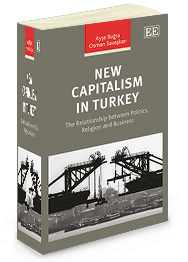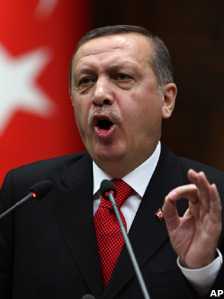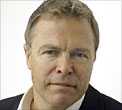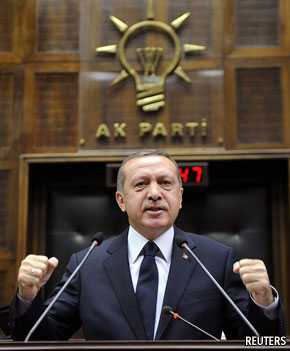The truth behind the “Turkish model”
 Contrary to received wisdom, the “Turkish model” was not based on the entrepreneurial potential of emerging conservative businessmen of Anatolia nurtured by market reforms and the Islamic outlook of the government, but on a regulatory framework changed to allow arbitrary government intervention in support of politically privileged entrepreneurs.
Contrary to received wisdom, the “Turkish model” was not based on the entrepreneurial potential of emerging conservative businessmen of Anatolia nurtured by market reforms and the Islamic outlook of the government, but on a regulatory framework changed to allow arbitrary government intervention in support of politically privileged entrepreneurs.
With former Prime Minister Erdoğan now firmly installed as President and promising a new Turkey, it is time to take a fresh look at the direction in which the country’s political economy is headed. For over a decade, international media and many academic researchers have presented the “Turkish model” under the “moderately Islamic” Justice and Development Party (AKP) as a success story of economic development and political democracy in a Muslim country – made all the more attractive in an international environment dominated by the fear of radical Islam.
Since 2013, especially after the massive nationwide protests in the summer of that year, this enthusiasm has left its place to more critical appraisals. The media coverage of the country is now dominated by statements of concern about the state of the economy – and the increasingly authoritarian character of the regime. The praise, where it still persists, now has a different character. The Hungarian Prime Minister Victor Orban, for example, recently pointed to Turkey (along with Singapore, China, India and Russia) to argue that non-Western countries which are not liberal democracies and “in some cases probably not even democracies” can be highly successful in the global race. However, Orban’s favourable assessment of Turkey’s performance as a global actor was preceded by several alarming accounts of the economy’s weaknesses, such as a huge current account deficit and the very high ratio of short term debt to the GNP.
How did this economic and political success story end up with a conspicuous democratic deficit and alarming economic vulnerability?
A critical assessment of conventional wisdoms that formed the widely accepted narrative on Turkey under the AKP could provide some answers. It was generally accepted that the AKP was committed to a free market economy where private business development could proceed without relying on government support and without being hindered by political intervention. The extension of industrial production to some Anatolian provinces, where local business people have acquired a more prominent position in an economy previously dominated by big enterprises located in a few industrial centres, has received particular attention. The popular press has published enthusiastic accounts of the rise of “Anatolian tigers,” while the academic literature has investigated the political implications of the changes in the business community. The new Anatolian business people have been praised for their competitiveness and non-reliance on state support, while their Islamic outlook became the subject of studies on the rise of political Islam and the compatibility of Islam with capitalist development and liberal democracy.
These common assumptions have precluded deeper scrutiny of the interfaces between economic and political processes, avoiding several key questions. Has the role of the government in the process of capital accumulation and in business life really become less important after the formation of the first AKP government in 2002? Does the emphasis placed on the emergence of provincial Anatolian capital provide an adequate explanation of the new dynamics of capital accumulation, the changing configuration of business interests, and the new types of alliances and conflicts that characterize the new Turkish business environment? How do the relationships between politics and business play out in the current political environment?
Retreat of the state or politically supported capital accumulation?
The AKP came to power after the devastating economic crisis of 2001 that clearly signalled that economic institutions and government-business relations had to be radically transformed to ensure economic stability. The market reforms that were introduced after the crisis were designed to separate the economy and politics. In the new regulatory framework, the autonomy of the economic bureaucracy was promoted and the scope of discretionary political intervention in the economy was limited.
Coming to power after the introduction of these reforms, the AKP declared its commitment to the reform process and to the privatisation of the economy. What followed was not, however, the retreat of the state and the affirmation of the self-regulating character of the market economy. Government remained a crucial actor in investments in infrastructure and in the construction sector, which became the engines of growth during the last decade and created immense opportunities for politically supported capital accumulation. Privatisation, particularly in energy and mining, proceeded under public regulation and government-business relations remained a crucial determinant of the profit opportunities that emerged in these areas. The commercialisation of public goods, such as the provision of health services, did not undermine the role of the government in a new system where private provision went together with public funding of the services provided.
During the last decade, there was a frenzy of legislative activity in all these areas. The legislative changes that expanded the scope of political discretion beyond the boundaries set by the regulatory framework, and against the involvement of the judiciary in policy decisions to protect public interests, were especially significant. For example, the Public Procurement Law, a central component of the economic reform process, was changed 29 times in the period between 2003 and 2013, with over one hundred amendments to its scope and applications, as well as revisions in the clauses determining the exceptions which increased from 8 to 19. One of the outcomes of these changes was the limitation of the authority of the independent Public Procurement Agency whose power to investigate controversial public tenders was significantly curbed with a decision taken in 2008.
The Public Procurement Agency was just one of the many Independent Regulatory Agencies that lost their autonomous powers through the last decade. Those operating in other areas also shared the same fate, until 2011 when a government decree practically ended their autonomy by placing them under the authority of the ministries in their respective areas of responsibility.
The expansion of prime ministerial power over the Privatisation Agency was especially important in sustaining the importance of political influence in the process of capital accumulation. Higher courts still tried to intervene to protect public interest in the privatisation process, until their prerogatives in this area were largely eliminated with the constitutional amendment accepted by the referendum held in 2010.
Since 2002, a politically supported process of capital accumulation has led to the emergence of a new group of big business people who have recently made their fortunes not at the local level, as conventional wisdom would have it, but at the level of the national economy by taking advantage of their privileged relations with government authorities. Big business almost never entered political analysis except with reference to old business groups established in Istanbul, and a few other large metropolises which are represented by TUSIAD (Turkish Industrialists and Business Association), whose relations with the government became increasingly tense in the second half of the 2000s. The extensive media coverage of the “Anatolian tigers” diverted attention from the spectacular rise of the new big business actors which were thrust into the limelight by the corruption scandals that erupted on 17 December 2013. While there was a cabinet reshuffle after the scandal, the investigation process was buried under the massive purges in the police force as the government moved to retaliate against what Erdoğan and his entourage called an “international conspiracy”.
As praise for the competitive potential of the provincial small and medium enterprises (SMEs) said to be ushered in by the new market economy continued, it was also overlooked that the newly introduced incentives provided by both central and the municipal administrations, had for the first time in Turkey’s republican history, made the government a significant actor in the economic activities of SMEs. Little attention was paid, in other words, to the changing political context of business activity – in big cities as well as in provincial towns – for business enterprises of all sizes.
The changes in the business environment continued with escalating political polarisation which was reflected in the different trajectories of business associations. TUSIAD, but also the umbrella organisation TURKONFED (Turkish Enterprise and Business Confederation) which represents about 10,000 provincial small and medium enterprises, opted for a model of capitalist development that incorporates a regulatory framework where the scope of political discretion would be minimised, as originally intended by the 2001 reforms. Their strategy for foreign economic relations favoured close relations with developed Western countries in general, and the European Union in particular, requiring the establishment of – and respect for – a legal framework where the exercise of discretionary power by the government would be limited. They also accepted organised interest representation by labour and a formal social policy approach in conformity with the prevailing European practices.
Another model of capitalist development took shape as the business actors close to the government opted for an economic strategy that allowed broader scope for discretionary political intervention in the economy. While during the early phases of the AKP government they did not explicitly oppose Turkey’s candidacy to the EU, these associations took an active part in a foreign policy orientation diverging from the country’s traditional Western-looking one. Their approach to industrial relations, as well as to questions of inequality and poverty, was significantly shaped by Islamic norms of moral conduct and social equity.
These choices regarding the institutional framework of the economy, and the strategic orientation of foreign economic relations, are closely related to the economic interests of the actors involved. Rule of law and bureaucratic autonomy are not particularly attractive to business associations that can better pursue their members’ interests in a setting where discretionary political intervention supports some business actors and marginalises others. The competitive potential of the newly emerging business enterprises of different sizes could be better furthered in trade and investment activities geared toward developing, rather than to developed, country markets. On the other hand, the established business enterprises which are at a different stage of capital accumulation and organisational development, are in greater need of institutions that protect private property and well defined rules that enable them to pursue their economic activities and be competitive in economic relations with developed countries. It is this alignment of economic interest and political outlook which explains the formation of the constituency of the AKP and the direction Turkish domestic and foreign policy strategy has taken during the last decade.
Contrary to received wisdom, the “Turkish model” was not based on the entrepreneurial potential of emerging conservative businessmen of Anatolia unleashed by a market friendly and moderately Islamic government, but on a regulatory framework which has been continuously modified to open more space for arbitrary government intervention in support of politically privileged entrepreneurs. This has, at times, involved the alarming use of tax inspections against the opponents of the regime. Environmental concerns, labour rights and attempts to create “decent work” opportunities do not appear among the government’s policy priorities. Neither does respect for human rights and freedom of expression. The regional pattern of foreign economic relations has changed with the increasing importance of non-OECD countries – countries of the Middle East in particular. With the political instability that now characterizes the new regions of economic interest to Turkey, the implications of this strategic orientation are increasingly dubious. This is the context of the now widely acknowledged vulnerability of the economy to external shocks, and the size of the country’s democratic deficit which is at least as high as the deficit of its current account.
Nonetheless, the prevailing economic and political relations are widely contested, and among detractors there are business actors who are still very powerful in terms of their competitive potential and the economic resources at their disposal. Ümit Boyner, the president of TÜSİAD between 2010 and 2013, once said that Turkey was faced with the choice of becoming a smaller China or a greater Finland. She obviously had more than economic policy choices in mind.
Whether Turkey still has these choices after the outcome of the recent presidential elections remains to be seen, especially if business associations once critical of the government decide that acquiescence would be more rational than confrontation. The part of Victor Orban’s statement placing Turkey among non-Western countries without liberal democracies remains valid, but its presentation as a global success story is highly dubious.
This article is based on a recently published book Ayşe Buğra and Osman Savaşkan: The New Capitalism in Turkey: The Relationship between Politics, Religion and Business, Edward Elgar Publishing, 2014


 I’m
I’m 